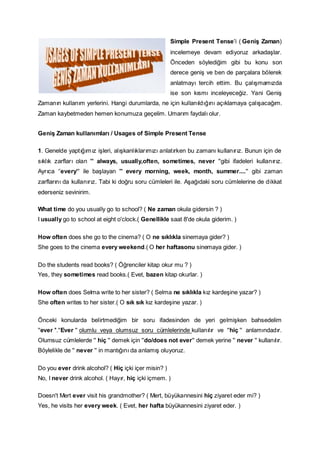
Simple present kullanım yerleri
- 1. Simple Present Tense'i ( Geniş Zaman) incelemeye devam ediyoruz arkadaşlar. Önceden söylediğim gibi bu konu son derece geniş ve ben de parçalara bölerek anlatmayı tercih ettim. Bu çalışmamızda ise son kısmı inceleyeceğiz. Yani Geniş Zamanın kullanım yerlerini. Hangi durumlarda, ne için kullanıldığını açıklamaya çalışacağım. Zaman kaybetmeden hemen konumuza geçelim. Umarım faydalı olur. Geniş Zaman kullanımları / Usages of Simple Present Tense 1. Genelde yaptığım ız işleri, alışkanlıklarımızı anlatırken bu zamanı kullanırız. Bunun için de sıklık zarfları olan '' always, usually,often, sometimes, never ''gibi ifadeleri kullanırız. Ayrıca ‘’every’’ ile başlayan '' every morning, week, month, summer....'' gibi zaman zarflarını da kullanırız. Tabi ki doğru soru cümleleri ile. Aşağıdaki soru cümlelerine de dikkat ederseniz sevinirim. What time do you usually go to school? ( Ne zaman okula gidersin ? ) I usually go to school at eight o'clock.( Genellikle saat 8'de okula giderim. ) How often does she go to the cinema? ( O ne sıklıkla sinemaya gider? ) She goes to the cinema every weekend.( O her haftasonu sinemaya gider. ) Do the students read books? ( Öğrenciler kitap okur mu ? ) Yes, they sometimes read books.( Evet, bazen kitap okurlar. ) How often does Selma write to her sister? ( Selma ne sıklıkla kız kardeşine yazar? ) She often writes to her sister.( O sık sık kız kardeşine yazar. ) Önceki konularda belirtmediğim bir soru ifadesinden de yeri gelmişken bahsedelim ''ever ''.''Ever '' olumlu veya olumsuz soru cümlelerinde kullanılır ve ''hiç '' anlamındadır. Olumsuz cümlelerde '' hiç '' demek için ''do/does not ever'' demek yerine '' never '' kullanılır. Böylelikle de '' never '' in mantığını da anlamış oluyoruz. Do you ever drink alcohol? ( Hiç içki içer misin? ) No, I never drink alcohol. ( Hayır, hiç içki içmem. ) Doesn't Mert ever visit his grandmother? ( Mert, büyükannesini hiç ziyaret eder mi? ) Yes, he visits her every week. ( Evet, her hafta büyükannesini ziyaret eder. )
- 2. 2. Doğa kanunları, genel geçerliliği olan fizik kanunları ve genellemeler için kullanılır. Water boils at 100 degress centigrade. ( Su, 100 derecede kaynar. ) The sun rises in the east and sets in the west.( Güneş doğudan doğar ve batıdan batar.) The world revolves around the sun. ( Dünya, güneşin etrafında döner. ) 3.İşin ne anlam ında '' What do you do '' sorusu sorulur. Eğer bir zaman zarfıyla kullanırsa o zaman zarfının belirttiği sürede ne yapıldığı anlam ına gelir. İki örneği karşılaştıralım. What do you do? ( İşin / Mesleğin ne? ) I am a teacher. (Ben bir öğretmenim. ) What do you do in the morning? ( Sabahları ne yaparsın? ) I usually have breakfast with my family.( Genellikle ailemle kahvaltı yaparım.) What does your mother at the weekends ? ( Annen haftasonları ne yapar? ) She usually cleans the house at the weekends.( Haftasonları genellikle evi temizler. ) 4.Televizyon programları, sinema, tiyatro gibi aktivitelerin başlangıç ve bitiş saatlerinde, uçak, tren ve otobüs gibi vasıtaların hareket ve varış saatlerinde, ders programlarının saatlerinde gelecek zaman anlamında bu zamanı kullanabiliriz. My class always begins at 8 and fini shes at 3 p.m. ( Dersim saat 8'de başlar ve saat 3 'te biter. ) My class begins at 8 tomorrow and fini she s at 3 p.m.( Dersim yarın 8 'de ba şlayacak ve saat 3'te bitecek. ) The plain to Istanbul takes off at 10.30 a.m. tomorrow and arrives there at 11.30 a.m. ( Istanbula gidecek olan uçak yarın saat 10.30'da havalanacak ve oraya saat 11.30'da iniş yapacak. ) The TV show Çok Güzel Hareketler Bunlar is on TV at 8 p.m. tonight. ( Tv programı Çok Güzel Hareketler Bunlar bu akşam saat 8'de televizyonda çıkacak. ) 5.Gazete, magazin veya haber manşetlerinde geçmiş zaman ( Simple Past Tense ) anlamında, Simple Present Tense ( Geniş Zaman ) kullanılır. A terrific accident happens on the highway. ( happens= happened ) ( Otoyolda feci bir kaza meydana geldi.) Fenerbahçe becomes champion of Turkish Super League in 2012. ( becomes=became ) ( Fenerbahçe 2012'de şampiyon oldu. )
